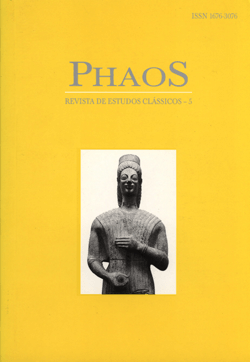O riso antigo: a Priapéia latina e uma paródia da Ilíada e da Odisséia
Palavras-chave:
Latin Priapea. Priapus. Parody. Phallicism. Odissey.Resumo
In the actual rite of Priapus, as a real god, it is testified by some sources that the deity was worshiped with laughter and jokes, so that the derrision in the Corpus Priapeorum poems, as we think, is a kind of reminiscence of the rituallaughter. In this paper we try to show that the Corpwl poems have the explicit purpose of making one laugh, just because Priapus as poetic character in what we call "Latin Priapea", has been appropriated together with turpitude and ridiculousness. So, priapeum 68 is translated and discussed for, unlike most of the pieces in the Corpus, it is not an epigram, but a longer poem, a parody whose object are the major characters of the Iliad and the Odissey, mainly Odisseus and Penelope. As a matter of fact, the very themes of both epics - Achilles' rage and Odisseus' deeds - are subsumed and debased in a very sophisticated way by the priapic, i. e., the phallic point of view. Despite the turpiloquium, the poem is a masterpiece.Referências
ADAMS, J. N. The Latin Sexual Vocabulary. Baltimore: John Hopkins University Press, 1982.
ARISTÓTELES, I1EpL TTOl TJTLK1], Ars poetica, Poetica, edición trilingüe por Valentin Garcia Yebra. Madrid: Gredos, 1974.
CÍCERO, De oratore, texte ét. et tr. par Edmond Courbaud, Paris: Les Belles Lettres, vol. I, lI, 1950. Vol III, 1930.
CÍCERO, Brutus and Orator, English translation by G. L. Hendrickson and H. M. Hubbell. Cambridge: Massachusets/ London: Harvard University Press, 1997.
GLARE, P. G. W, Oxford Latin Dictionary, Oxford: Oxford University Press, 1985.
MAGGI, Angelo, I Priapea; revisione de testo e commento di Angelo Maggi. Napoli: Tipografia degli Artigianelli, 1923.
Downloads
Publicado
Edição
Seção
Licença
Ao se submeterem textos para a PhaoS, seus autores devem estar cientes de que, se aprovados para publicação, a revista terá sobre eles todos os direitos autorais pertinentes. Originais não serão devolvidos.

